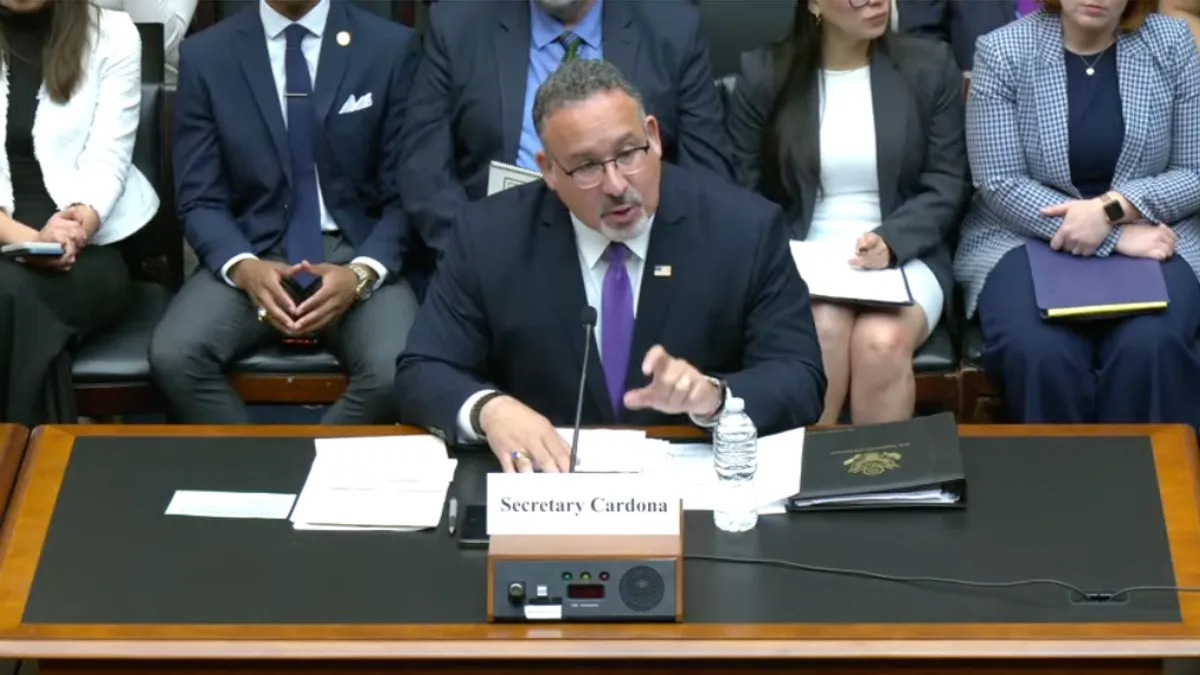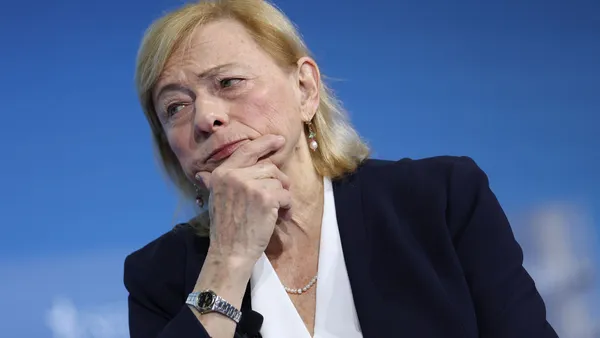Dive Brief:
- U.S. Secretary of Education Miguel Cardona defended an array of K-12 policies and proposals — including COVID-19 aid accountability, proposed guidance on transgender students' participation in sports, and a request for increased funding — during questioning Tuesday at a House Committee on Education and the Workforce hearing.
- Rep. Rick Allen, R-Ga., criticized the department's accountability for $189.5 billion in federal COVID-19 emergency funding, saying "we are effectively throwing money down a dark hole." Cardona responded that the department takes its fiscal responsibility seriously, is tracking spending through a data transparency portal, and is helping states with monitoring practices.
- During the hearing, Cardona promoted the U.S. Department of Education's proposed FY 2024 budget of $90 billion — a $10.8 billion increase over the current year. When pressed about what could be cut to address the nation's debt level, Cardona said, "Investing in education, to me, is investing in our country's economic prosperity."
Dive Insight:
Some of the most tense questioning during the nearly five-hour hearing centered on the Education Department's proposed rule on transgender students' participation in school sports. That proposal would prohibit a complete ban on transgender students’ participation on athletic teams aligning with their gender identities but allow flexibility for local educators to develop exceptions in certain circumstances.
When Rep. Burgess Owens, R-Utah, asked Cardona if it would be OK if a transgender woman exposed themselves in a women's bathroom, the secretary answered there was nothing in the Title IX proposed regulations to dictate bathroom use.
Later in the hearing, Rep. Mary Miller, R-Ill., asked Cardona, "Can you say unequivocally that biological males should never be allowed in girls' locker rooms and showers?"
The secretary reiterated that decisions about bathroom use are made at the local level.
Concerns about low student achievement rates were voiced by both Republican and Democrat lawmakers. GOP committee members suggested expanded school choice options as a remedy, while Democrats urged support for more resources, particularly for students from low-income communities and students with disabilities.
Ranking member Rep. Bobby Scott, D-Va., said the Education Department's FY 2024 proposed budget would be "transformational for our educational system" by helping to close achievement gaps at underserved schools and expanding access to career and technical education programs, among other initiatives.
GOP-endorsed cuts, on the other hand, would eliminate billions of dollars for schools serving students from low-income families and cut 60,000 teachers from the educator workforce , Scott said.
Of the budget request, Cardona said, "The choice we face now is whether we're going to build on common ground that we have to invest in our children or protect a broken status quo that is failing too many of our students."
President Joe Biden and House Republican leaders are currently in negotiations over raising the debt ceiling and spending cuts demanded by the GOP for doing so. The 2024 fiscal year begins Oct. 1.
Rep. Jahana Hayes, D-Conn., said she was pleased that the FY 2024 proposed budget includes $500 million for a new demonstration program to expand access to free preschool. Demand for Head Start early childhood services for students from low-income families exceeds available spots in the program, Hayes said.
"Unfortunately, in 2019, about 100,000 children lived in poverty in Connecticut, which means that around 95,000 children did not receive access to early math and reading readiness, for immunizations, dental and medical care that Head Start provides," she said.
Throughout the hearing, Cardona and lawmakers from both sides of the aisle emphasized the importance of parental involvement in education.
A Republican-endorsed bill, titled the Parents Bill of Rights Act, passed the full House in March. It would require school systems to publicly post their curricula, provide parents with a list of library books, provide two teacher-parent conferences a year, and give parents the right to review district budget practices, among other requirements.
As a former teacher and principal, Cardona said he provided many of those same rights to parents. However, he doesn't support the bill's focus on giving the federal government a greater role in monitoring local issues.
"I say we play a supporting cast, and the schools that are most effective are those that honor and engage parents in a meaningful way," Cardona said.













